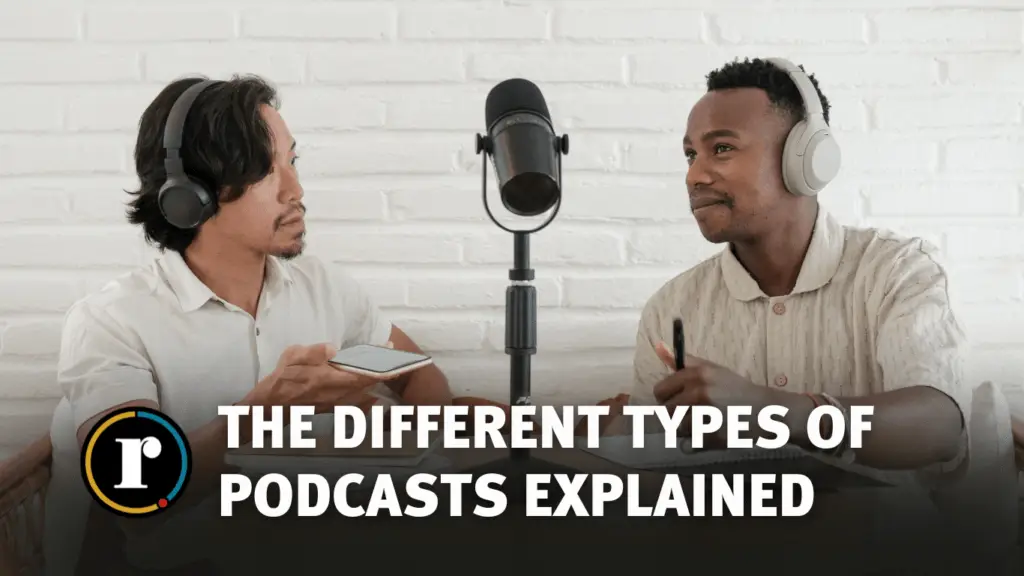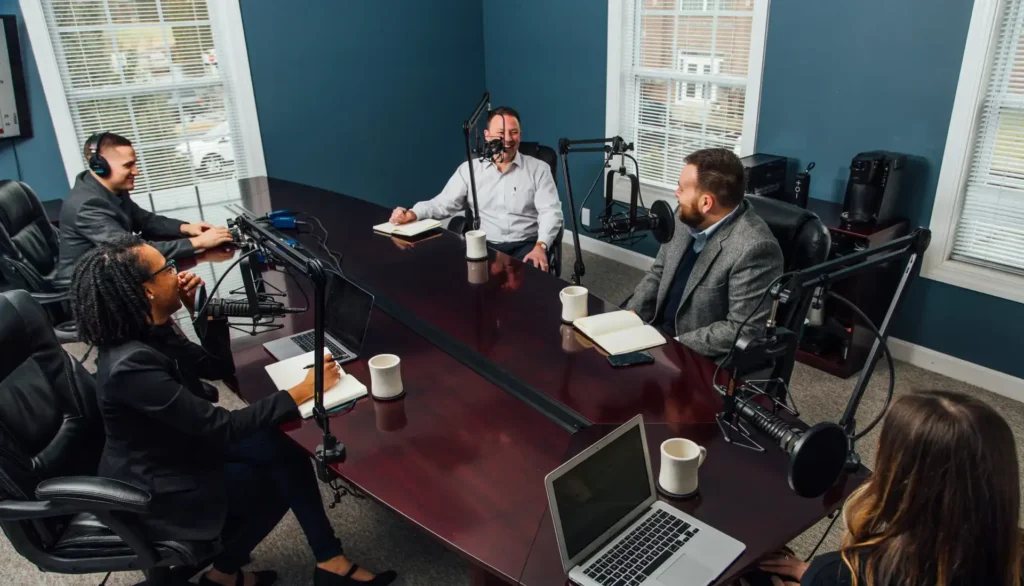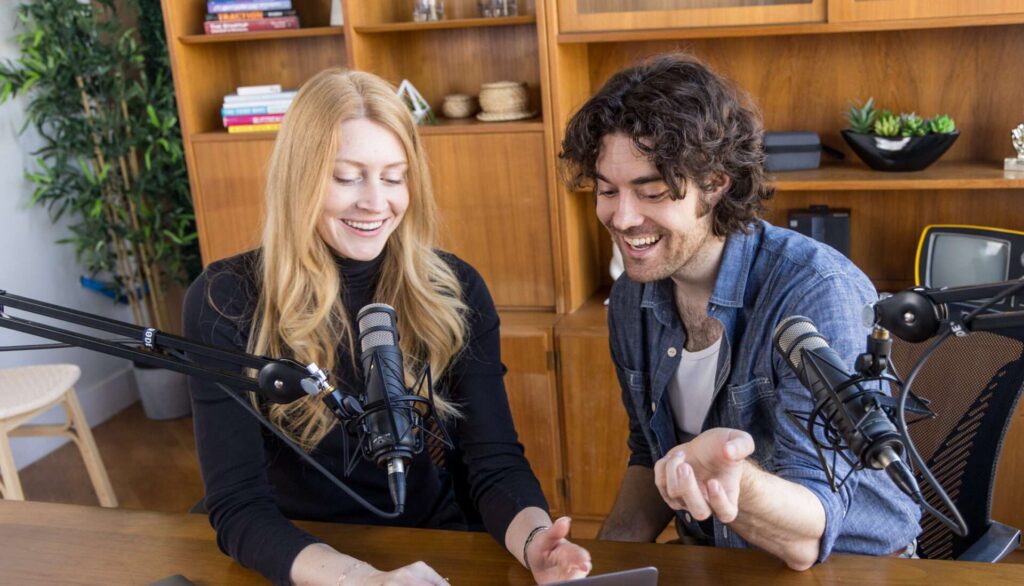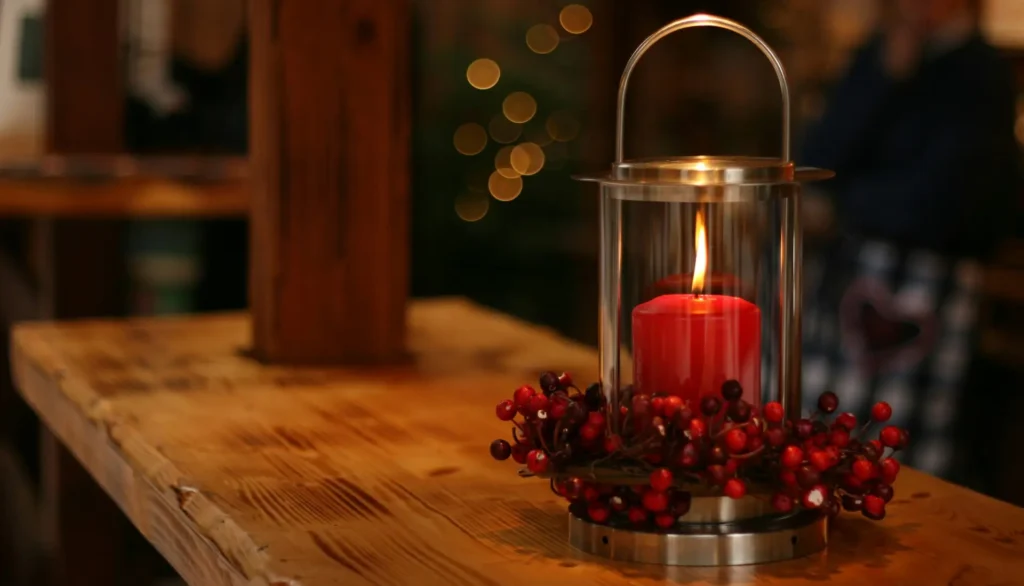Quick Note: Some of the links in this blog post may be affiliate links which will give us a small commission fee (at no extra cost to you).
Choosing the right podcast format (i.e., how many people host and appear on the podcast) can be essential to widening the reach of one’s podcast. The early stages of launching a podcast is the ideal time to think about the format, as it determines what your podcast’s content will be.
Beyond securing the basics of sound design, audio quality, mitigating background noise, finding or becoming a good podcast editor, and other tasks, successful podcasting involves careful consideration of the format.
The Importance of Format
Successful podcasters know that keeping listeners engaged involves more than just engaging content. The ideal listening experience for a given target audience may depend on the format of the show itself. Some people want to hear loose freewheeling improvised conversations between comedians. Others want a tightly structured interview with extensive show notes about a specialized topic.
In those instances, the content is what the hosts actually discuss. The format is the dynamic that the podcast offers. If the format seems like it would produce the kind of content that the listener is interested in hearing, then it is just as key as content for getting listeners.
Otherwise, a listener interested in comedy podcasts would not distinguish between a name-brand podcast that interviews celebrity entertainers and an obscure solo podcast by an obscure amateur comedian.
This blog looks at some of the most popular types of podcasts and their formats. Keep in mind that many podcasts are a combination of formats. For instance, a cohosted podcast may also have guests on for interviews.
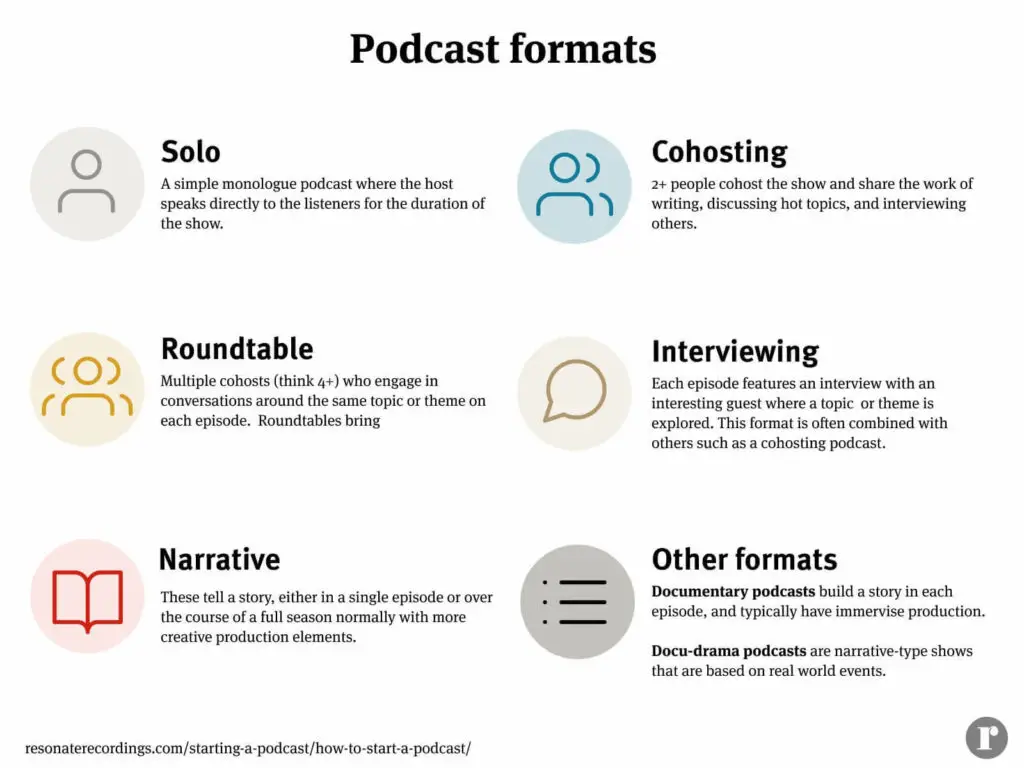
Going Solo
The solo podcast form is a simple “monologue” podcast featuring the host speaking directly to the listeners for the duration of the show.
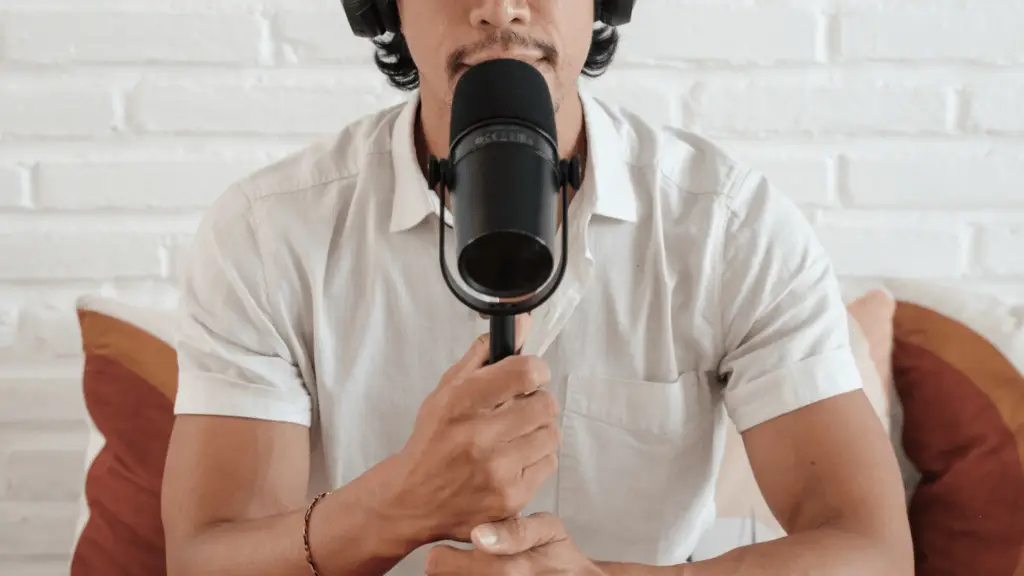
Solo podcasts are great for individuals looking to promote themselves. Often, the host is an expert in a field and seeks to share a wealth of insights with an audience.
A major benefit is that the host is free to record without being dependent on the schedules of co-hosts or guests.
Solo shows can also be great for comedians, celebrities, and news podcasts.
Post-production work can also be easier since you do not need to worry about the other cohosts’ and guests’ approval. If you like it, you can put it out!
However, while it may sound “easy enough,” monologue shows are often challenging for new podcasters. Maintaining engaging delivery with only one voice is not an easy task (though not an impossible one!). It takes a well-developed delivery, the ability to improvise, and a sense of what makes interesting solo content to be engaging to listeners. But, as with many things in life, the more one practices, the better one gets!
Also, naturally the solo podcaster can have a guest on now and then–there is no rule written in stone that a usually solo-format podcast cannot occasionally have a guest on!
Notable Examples
Hardcore History with Dan Carlin
Cohosting
Cohosted podcasts are where two or more people cohost the show. The potential for entertaining banter, discussions, arguments, and the like, makes this one of the most popular podcast formats.
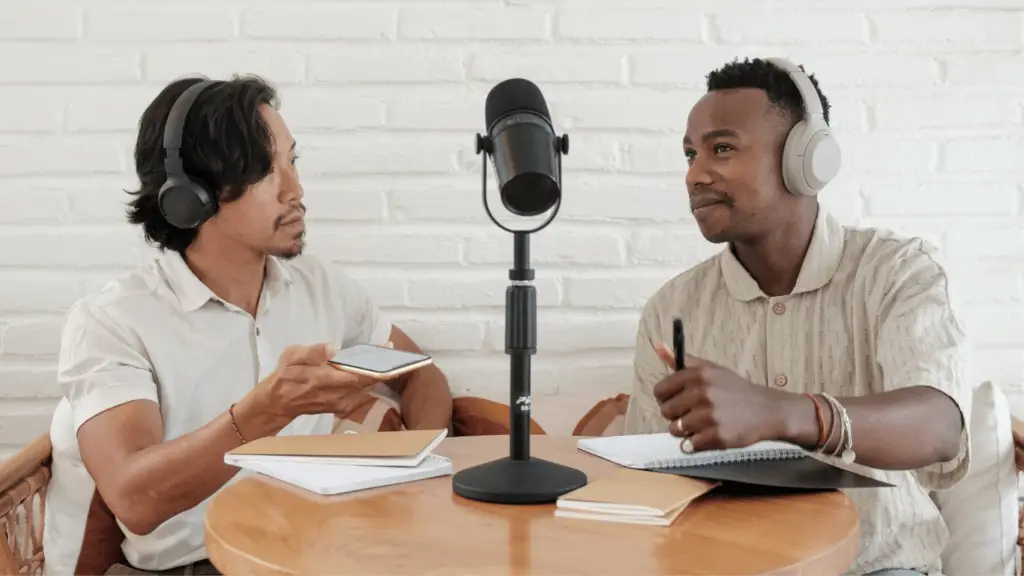
Cohosting is a popular podcast format for friends, coworkers, and other dynamic duos (or trios).
While solo podcasting can be very intimidating, adding a cohost into the mix can make it more comfortable to be on the mic, especially if the cohost is easy to have a conversation with.
There are two important things to consider when working with a cohost:
Get in writing an agreement about who owns the copyright to the podcast, and how to divide up any earnings from the podcast.
Align schedules for recording frequent episodes.
Notable Examples
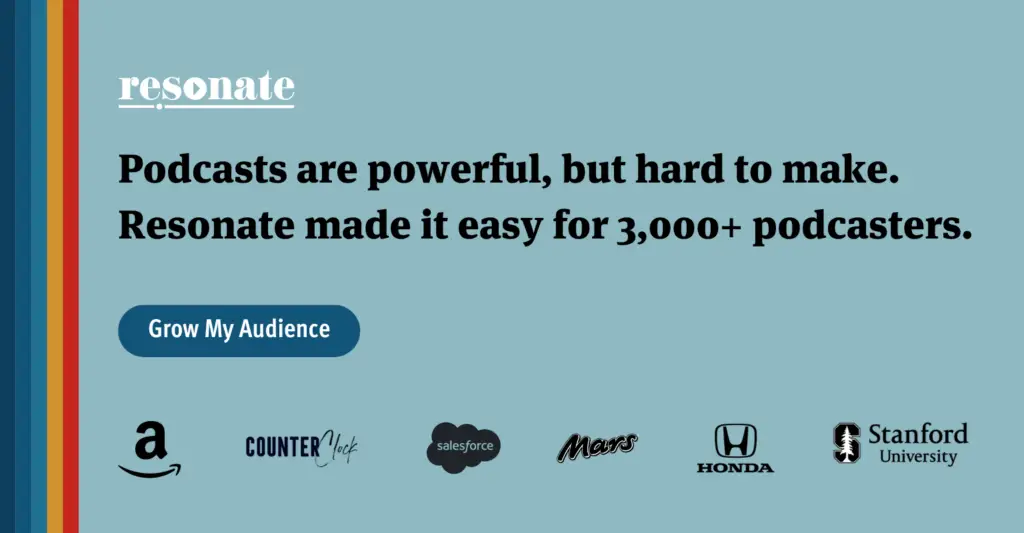
Roundtable
Roundtable podcasts are shows with many cohosts (at least four) who engage in a series of recorded conversations.
This format is great for commentary and banter, where everyone offers their opinion on a hot topic, news, or trend. Having multiple hosts can help you appeal to a wider audience since each listener can gravitate toward one host or another.
Just like cohosted shows, it’s important to establish who owns the copyright of the podcast, and how you will divide any money generated from the show. Make sure you talk to everyone on your team and put it in writing before you take this route.
Notable Examples
The Interview
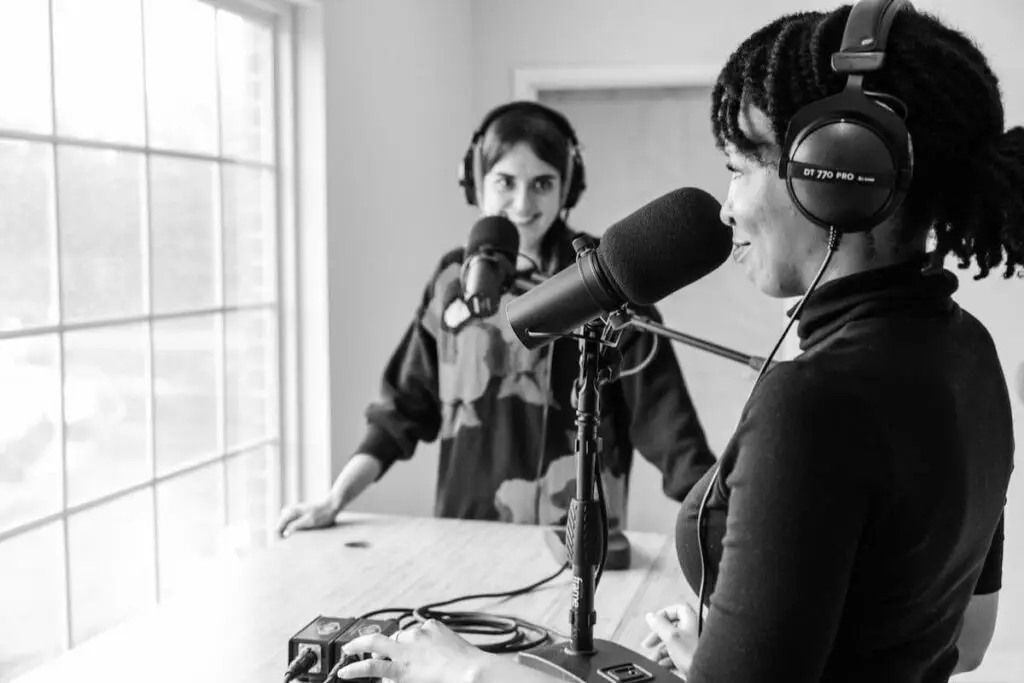
This may be the most popular format of all. One of the unique benefits of podcasting as a medium is that it offers an up-close-and-personal experience with people that the listener may not have direct personal access to. Think of high-profile politicians, celebrity entertainers, and the like.
Podcast interviews make recorded, typically casual-sounding conversations with such people accessible at scale.
Interviews are an amazing win-win formula. They give your audience the value of an intimate conversation with an interesting guest, and an opportunity for your guest to expand their audience by appearing on your show.
Some interview podcasts are hosted by a solo host, while others have more cohosts.
Remember that it’s common to have a mixture of solo and interview episodes. You don’t have to be exclusive to one format or the other in that regard; there is an opportunity to include both formats on your show, depending on what is needed to provide an in-depth discussion surrounding a particular topic.
Notable Examples
Narrative
Podcasts written in narrative style typically tell a story, either in a single episode or throughout an entire season. They weave together different formats to create an engaging audio experience for listeners. It feels like listening to a TV show.
Narrative podcasts typically have many sound effects, interview recordings, and music beds. They are normally led by voiceover narration from the host.
You’ll often see this format used in true-crime podcasts and fiction-storytelling podcasts in particular. Whether it is about real life or a fictional setting, people like to immerse themselves in a narrative.
This is a great format to consider, as it typically offers a high level of engagement for the listener because of the production components. There have been many award-winning narrative podcasts because of the format’s ability to grip an audience.
However, it’s not for everyone. These podcasts are more time-consuming because of the writing, recording of extra audio, and additional production involved.
Additionally, not all content lends itself to this style of podcasting.
Notable Examples
Other formats
Some additional formats include Documentary and Docu-Drama shows.
Documentary podcasts build a story in each episode or over many episodes. These typically have lots of sound bites, music beds, narration from a host, etc. They tell a true story and bring it to life for the audience.
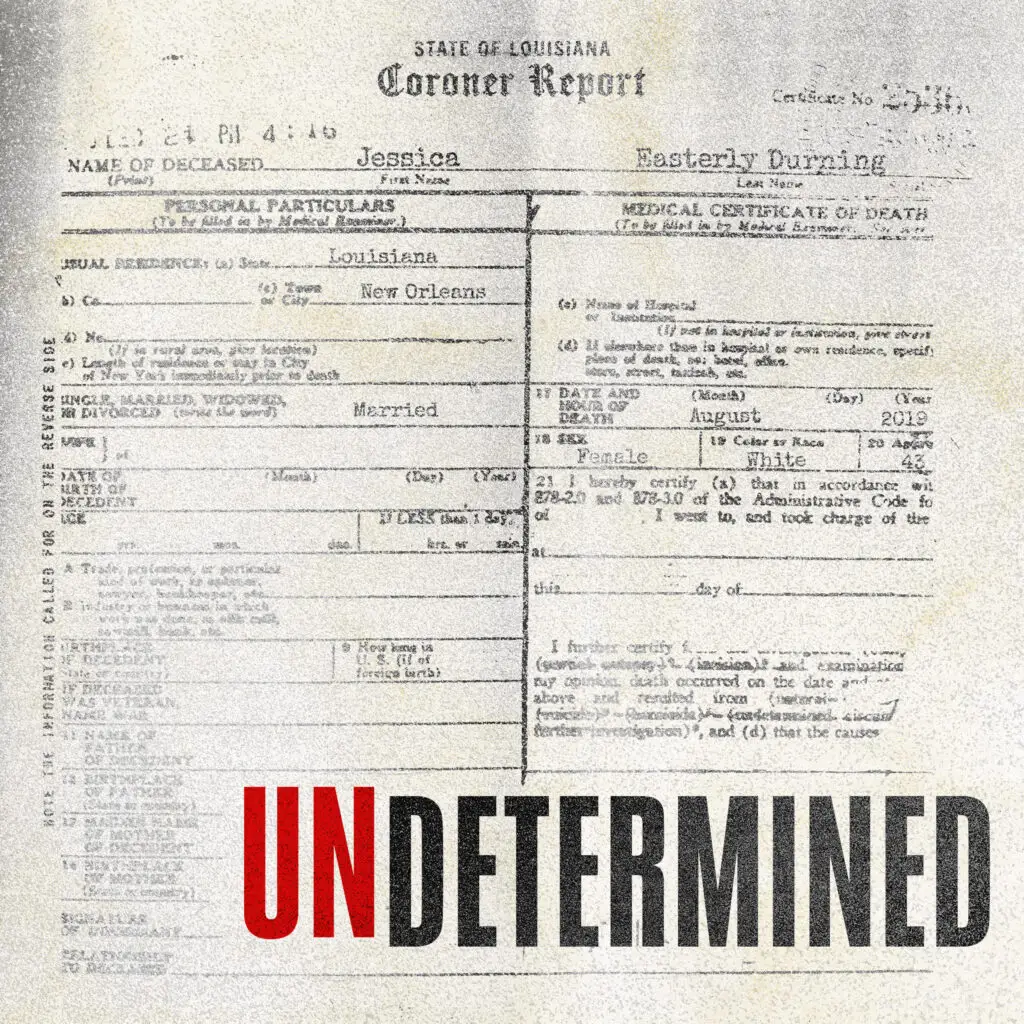
An example of this is the podcast Undetermined. It tells the story of the mysterious death of Jessica-Easterly-Durning in New Orleans. Listeners get to enjoy the experience of having the details of this case presented to them in an entertaining fashion.
Docu-drama podcasts are narrative-type shows that are based on real-world events. They are a subgenre of narrative podcasts that weave together storytelling, interviews, and re-enactments of events to immerse you in a story, sound effects, and music, all to create a compelling story.
Notable Examples
Episodic and Serial Podcasts
Once you choose a format, you’ll need to decide on your podcast ‘type.’ While there are many different formats for your podcast, there are two general types of podcasts: episodic and serial.
Episodic podcasts tell a different story or concept every episode and can be listened to out of order. Examples of episodic media include:
Serial podcasts tell a story and build on top of each other, and must be listened to in chronological order. Examples of serial media include:
Once you choose a format, you’ll need to decide on your podcast ‘type.’ While there are many different formats for your podcast, there are two general types of podcasts: episodic and serial.
- Examples of episodic media includes:
- Black Mirror
- Modern Family
- The Twilight Zone
- Law and Order
- Examples of serial media includes:
- Game of Thrones
- White Lotus
- Netflix’s You
- Pride and Prejudice
Resonate Recordings
Now that you know the different podcast types, it’s time to choose one that best reflects your goals and content. We can help guide you through this process. Our experienced team can do everything from professional audio and video recording to creating the show’s cover.
Need professional help launching your podcast? If you need support getting your podcast off the ground, our podcast producers are here to help. We can handle many aspects of the production process, such as putting your show on all the major platforms (Apple Podcasts, Spotify, and the like). We also record and edit with high production standards.
Resonate Recordings is a comprehensive podcast production company. Headquartered in Derby City (i.e., Louisville, Kentucky), we are committed to developing partnerships with our clients, not just performing transactions.
Since 2014, it’s been our mission to make podcasting easy for businesses, brands, entrepreneurs, and individuals. We do this by providing support with podcast launch, consulting, editing, production, and other creative podcasting services.
Now that you know the different types of podcasts there are, it’s time to choose one that best reflects your goals and content.
Need help launching your podcast? If you need support in getting your podcast off the ground, our podcast producers are here to help.
